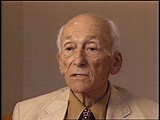You searched for: Auschwitz
<< Previous | Displaying results 141-150 of 878 for "Auschwitz" | Next >>
-
Fritzie Weiss Fritzshall describes receiving help from a prisoner in the "Kanada" detail upon arrival at Auschwitz
Oral HistoryFritzie's father immigrated to the United States, but by the time he could bring his family over, war had begun and Fritzie's mother feared attacks on transatlantic shipping. Fritzie, her mother, and two brothers were eventually sent to Auschwitz. Her mother and brothers died. Fritzie survived by pretending to be older than her age and thus a stronger worker. On a death march from Auschwitz, Fritzie ran into a forest, where she was later liberated.
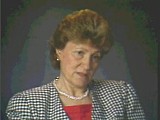
-
Miso (Michael) Vogel describes the brutality of SS guards towards new arrivals at Auschwitz
Oral HistoryIn 1939, Slovak fascists took over Topol'cany, where Miso lived. In 1942, Miso was deported to the Slovak-run Novaky camp and then to Auschwitz. At Auschwitz, he was tattooed with the number 65,316, indicating that 65,315 prisoners preceded him in that series of numbering. He was forced to labor in the Buna works and then in the Birkenau "Kanada" detachment, unloading incoming trains. In late 1944, prisoners were transferred to camps in Germany. Miso escaped during a death march from Landsberg and was…
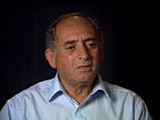
-
Irene Hizme and Rene Slotkin describe being separated from their mother upon arrival in the Auschwitz camp
Oral HistoryIrene and Rene were born Renate and Rene Guttmann. The family moved to Prague shortly after the twins' birth, where they were living when the Germans occupied Bohemia and Moravia in March 1939. A few months later, uniformed Germans arrested their father. Decades later, Irene and Rene learned that he was killed at the Auschwitz camp in December 1941. Irene, Rene, and their mother were deported to the Theresienstadt ghetto, and later to the Auschwitz camp. At Auschwitz, the twins were separated and subjected…
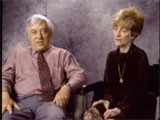
-
A Polish former inmate of Auschwitz testifies during the Pohl/WVHA trial
PhotoA Polish former inmate of Auschwitz identifies Oswald Pohl while on the stand for the prosecution during the Pohl/WVHA trial. This trial, case #4 of the Subsequent Nuremberg Proceedings, took place in a room in the Palace of Justice which was not the main courtroom. Nuremberg, Germany, April 18, 1947.
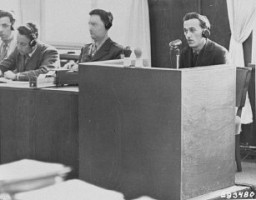
-
Leo Schneiderman describes conditions on a freight car during deportation from Lodz to Auschwitz
Oral HistoryThe Germans invaded Poland in September 1939. Leo and his family were confined to a ghetto in Lodz. Leo was forced to work as a tailor in a uniform factory. The Lodz ghetto was liquidated in 1944, and Leo was deported to Auschwitz. He was then sent to the Gross-Rosen camp system for forced labor. As the Soviet army advanced, the prisoners were transferred to the Ebensee camp in Austria. The Ebensee camp was liberated in 1945.
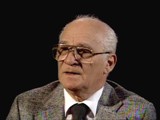
-
Lilly Appelbaum Malnik describes death march from Auschwitz to Bergen-Belsen
Oral HistoryGermany invaded Belgium in May 1940. After the Germans seized her mother, sister, and brother, Lilly went into hiding. With the help of friends and family, Lilly hid her Jewish identity for two years. But, in 1944, Lilly was denounced by some Belgians and deported to Auschwitz-Birkenau via the Mechelen camp. After a death march from Auschwitz, Lilly was liberated at Bergen-Belsen by British forces.
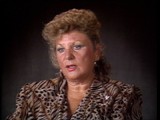
-
Ludmilla Page recalls arriving in Auschwitz instead of Oskar Schindler's munitions factory in Brünnlitz
Oral HistoryLudmilla was born to an assimilated Jewish family in Kishinev, Romania. She and her mother, a physician, were living in Poland when the Germans invaded on September 1, 1939. They were taken to Krakow. Ludmilla was forced to live in the Krakow ghetto; her mother was sent to the Warsaw ghetto. Ludmilla worked in a factory at the Plaszow labor camp for a businessman who was a friend of the German industrialist Oskar Schindler. In October 1944, Schindler attempted to save some Jewish workers by relocating them…
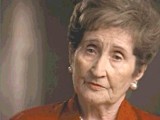
-
Fritzie Weiss Fritzshall describes deportation in cattle car to Auschwitz
Oral HistoryFritzie's father immigrated to the United States, but by the time he could bring his family over, war had begun and Fritzie's mother feared attacks on transatlantic shipping. Fritzie, her mother, and two brothers were eventually sent to Auschwitz. Her mother and brothers died. Fritzie survived by pretending to be older than her age and thus a stronger worker. On a death march from Auschwitz, Fritzie ran into a forest, where she was later liberated.
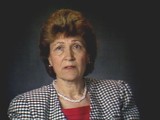
-
Auschwitz fence posts and Elie Wiesel quote on display at the United States Holocaust Memorial Museum
PhotoThis photograph shows Auschwitz fence posts and a quote from Elie Wiesel's Night . They are on display in the third floor tower room of the Permanent Exhibition at the United States Holocaust Memorial Museum. "Never shall I forget that night, the first night in camp, which has turned my life into one long night, seven times cursed and seven times sealed. Never shall I forget that smoke. Never shall I forget the little faces of the children, whose bodies I saw turned into wreaths of smoke beneath a silent…
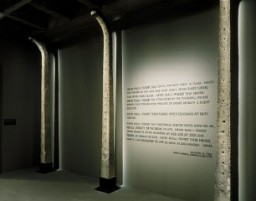
-
Joseph Maier describes former Auschwitz commandant Rudolf Hoess at the Nuremberg trial
Oral HistoryJoseph immigrated to the United States in 1933 after finishing university in Leipzig. His parents and brother had left Germany earlier for the United States. Joseph attended Columbia University. From 1940 to 1943 he was assistant editor for a New York German-Jewish newspaper. In 1944, he worked in the American embassy in Britain as a propaganda analyst. He went to Nuremberg, Germany, as an interpreter in 1946. He analyzed materials and transcripts, and participated in many interrogations for the Nuremberg…
